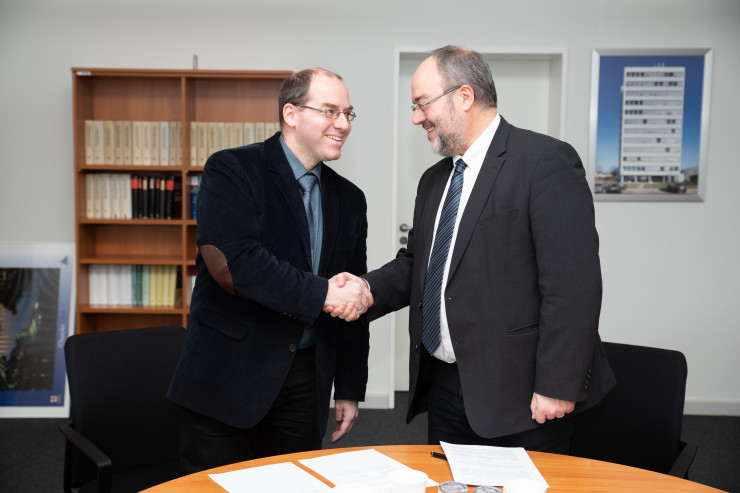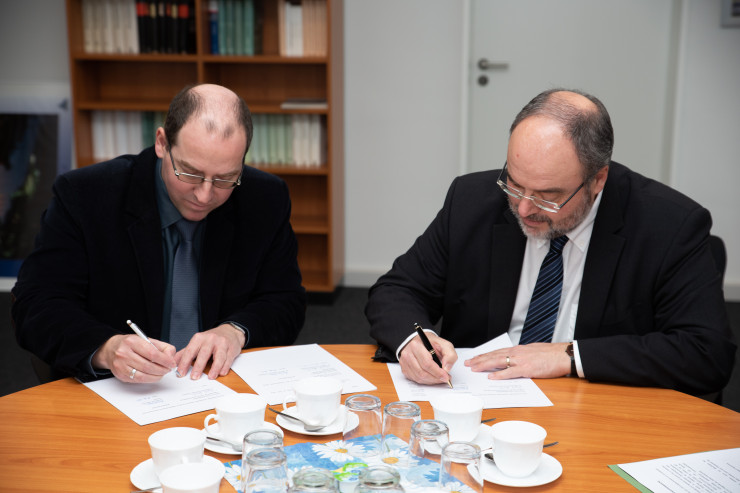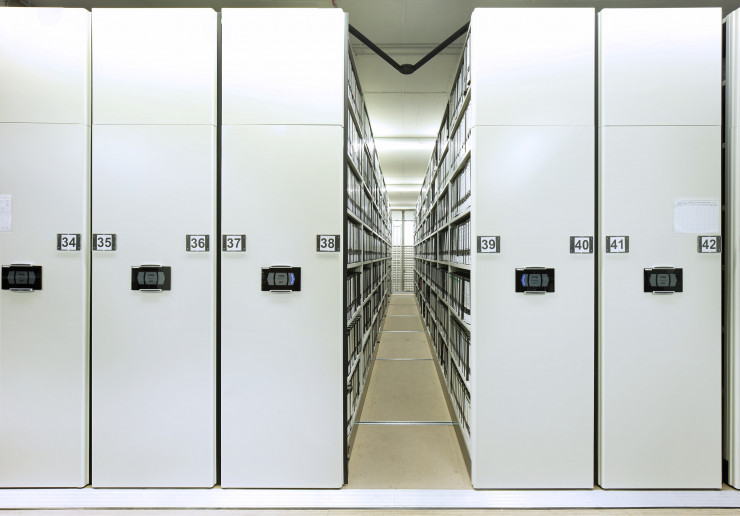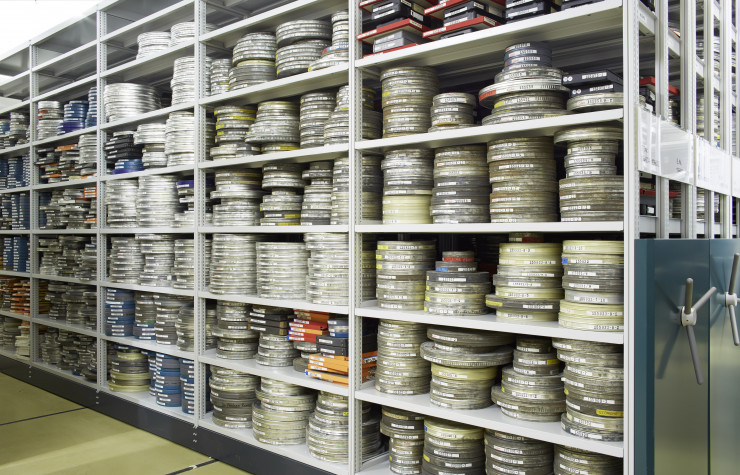Cooperation between the Pilecki Institute and the Bundesarchiv - Instytut Pileckiego
Cooperation between the Pilecki Institute and the Bundesarchiv
Key documents of the Bundesarchiv concerning 20th century history will be digitized en masse by the Institute and added to its digital holdings. Plans are also in place to make these copies available in Warsaw.

The agreement undersigned by the Pilecki Institute and the Federal Republic of Germany provides for broad cooperation which will allow the Pilecki Institute to digitize en masse key documents from the collections of the Bundesarchiv concerning the 20th century. These digital copies, together with the existing digital database, will be made available in Warsaw, while cooperation with the Institute will also augment the electronic collections of the German Federal Archive.
The Agreement between the Pilecki Institute and the Bundesarchiv is the first and to date only cooperation project of its type to be established by a Polish research institute and the German Federal Archive. In the preamble to the document, we read among others: The history of the 20th century has proved essential and formative for understanding and managing the challenges of contemporary times, and also for building harmony and developing constructive cooperation between the nations of Europe; Access to archival resources and the creation of conditions facilitating collaboration between the young generation of Polish and German scholars are fundamental for guaranteeing the advancement of meaningful research and dialog about the recent past.

The Agreement is a momentous initiative, and its ultimate objective is the creation by the Pilecki Institute of a digital archive of collections gathered from around the world. Significantly, it provides that already in the present year the Pilecki Institute will obtain digital versions of archival materials that are of key importance for research into the history of the Second World War and the German occupation, as well as the interwar period.
– The Pilecki Institute is commencing the digitization of the Bundesarchiv’s collections from individual of its agencies in Germany – said Wojciech Kozłowski, the Director of the Pilecki Institute.
We are specifically interested in materials concerning the occupation of Poland, with a particular emphasis on those presenting the fates of Poles and Jews during the Second World War.
– The digitization of German archives is the prerequisite for a proper understanding of the 20th century, and especially of the dark period of the Nazi occupation of Europe. Access to archival resources and close cooperation between the Polish and German side are of equally fundamental importance for creating a platform of cooperation and dialog on the common history of our two nations – stressed Kozłowski.

– The very reason why archives exist is to provide access to the documents which they contain, in accordance with currently valid legal provisions – declared the President of the German Federal Archive, Michael Hollmann. – In the age of digitization, archives are much less frequently used at their physical locations.
The digitization of large archival resources by the Pilecki Institute will bring with it numerous benefits. The provision of access to its digitized holdings in Warsaw should further stimulate Polish historical research, while the Federal Archive will gain considerable support for its digitization activities from its partner institution.
Our digital holdings will grow at an even greater pace, and this will be of advantage to all those who use them.
Broad Cooperation
Cooperation between the two institutions will focus on a specific period of history, however the first documents to be digitized will be those concerning the Second World War and the German occupation of Poland. The Pilecki Institute intends to digitize successive batches of materials, and their copies will remain at the Bundesarchiv.
– The copied files will include documents from the Personal Adjutancy of the Reichsführer SS, and also a range of archives concerning the SS and Gestapo – explained Hanna Radziejowska, the Plenipotentiary of the Pilecki Institute for Polish-German Cooperation. – Furthermore, the Institute will receive administrative and economic documents generated on former territories of the German Third Reich – Radziejowska added. – It should be noted that we are currently analyzing and cataloging prewar video materials which are held in the German archives. Working jointly with a team of researchers from the Institute and our partners from the Bundesarchiv, we are determining the order in which these materials will be digitized.

– Polish scholarship has significant achievements in research into the history of National Socialist Germany and Nazi occupation policy. From the 1990s, however, interest has shifted eastwards, with considerable emphasis being placed on the study of Soviet policy. This is understandable following the long years when it was a taboo subject. – said Professor Piotr Madajczyk, a historian from the Unit of German Studies at the Institute of Political Studies of the Polish Academy of Sciences in Warsaw. – Nevertheless, Polish research into the history of the Third Reich has started to lag behind that conducted in other countries, which is proceeding at pace. Recent years have brought a change, while now the availability of materials from the Bundesarchiv will act as an impulse for every Polish historian to intensify research. And I am not concerned here with just the documentation of members of the NSDAP, which was most readily touched upon in the media. Of equal importance are the materials concerning administrative and economic affairs, for they too require a considerable amount of research. The importance of the documentation pertaining to the Reichsführer SS does not even need to be mentioned – he added.
A Source of Knowledge for Researchers
The Pilecki Institute plans to conduct a comprehensive study of these sources, and also make them available to interested scholars.
– Access to these collections and materials will allow us to organize international research seminars, grants and scholarships – informed Wojciech Kozłowski. – One of our primary objectives is to embark on a combined study of the collections contained in German archives and of Polish sources devoted to the occupation of Poland. We take care to ensure that historical truth about the Second World War is founded on a broad and suitably verified source base. The conclusion of the agreement between the Pilecki Institute and the Bundesarchiv is an important step towards a more meaningful and detailed study of our historical experience. It presents us with an extraordinary opportunity to achieve a better understanding of the context, circumstances and realities of the German occupation – added the Director of the Pilecki Institute.
Bundesarchiv
The Federal Archive has in its holdings documents that are of the greatest importance for researchers of German modern and recent history. They include files, individual documents, maps, photographs, posters, films and sound recordings, both analog and digital, authored by the central institutions of the Federal Republic of Germany and its legal predecessors. The role of the archive is both to secure these resources and make them available pursuant to the provisions of the Federal Archive Act. Presently, the Bundesarchiv has nine agencies throughout Germany, in which there are stored approx. 400 km of documents, 13 million photographs and 2 million maps and plans. Furthermore, the Federal Archive is one of the largest repositories of video materials, with an imposing collection of German-language feature films and documentaries.
The Pilecki Institute
The Pilecki Institute is a research center set up with the objective of conducting international research into 20th century history and creating a digital repository of documents from both Polish and foreign archives. It was established to commemorate, document and study the history of the 20th century, with particular emphasis on the experience of Poland and the fate of Polish citizens. The Pilecki Institute has been established to facilitate an interdisciplinary and international analysis of issues and developments that were of key importance for the political history of the period, these being the Nazi and Soviet totalitarianisms and the global consequences of their actions.
See also
- 2025 | Michał Bilewicz, „Traumaland. Polacy w cieniu przeszłości"
News
2025 | Michał Bilewicz, „Traumaland. Polacy w cieniu przeszłości"
Michał Bilewicz’s “Traumaland. Polacy w cieniu przeszłości” (Wydawnictwo MANDO/Wydawnictwo WAM) won the Witold Pilecki International Book Award in the “academic history book” category.
- 2025 | Emil Marat „Bratny. Hamlet rozstrzelany"
News
2025 | Emil Marat „Bratny. Hamlet rozstrzelany"
The book “Bratny. Hamlet rozstrzelany” (Wydawnictwo Czarne) won the Witold Pilecki International Book Award in the “historical reportage” category.
- Maksym Eristavi, Russian Colonialism 101. How to Occupy a Neighbor and Get Away with It. An Illustrated Guide
News
Maksym Eristavi, Russian Colonialism 101. How to Occupy a Neighbor and Get Away with It. An Illustrated Guide
Maksym Eristavi’s “Russian Colonialism 101. How to Occupy a Neighbor and Get Away with It. An Illustrated Guide” (IST Publishing) won the the Witold Pilecki International Book Award in the “special prize” category.
- The Witold Pilecki International Book Award: Bilewicz, Marat and Eristavi winners of the Institute’s 5th competition for best history book
News
The Witold Pilecki International Book Award: Bilewicz, Marat and Eristavi winners of the Institute’s 5th competition for best history book
The Witold Pilecki International Book Awards were presented during a ceremony on Thursday 11 December, in the auditorium of the Pilecki Institute.
- Conference summary “Die Haltung der deutschen Minderheiten im besetzten Europa (1939–1945). Forschungsmethoden, soziale Kontexte und Nachkriegsfolgen”
News
Conference summary “Die Haltung der deutschen Minderheiten im besetzten Europa (1939–1945). Forschungsmethoden, soziale Kontexte und Nachkriegsfolgen”
On 20–21 November 2025, an international academic conference was held in Berlin and addressed issues of the attitudes of the German population during the occupation and their postwar fate.
- Results of the Competition for the position of Manager of the Extraneous Branch of the Witold Pilecki Institute of Solidarity and Valor in Berlin
News
Results of the Competition for the position of Manager of the Extraneous Branch of the Witold Pilecki Institute of Solidarity and Valor in Berlin
Warsaw, 20 November 2025 | Announcement of the results of the Competition for the position of Manager of the Extraneous Branch of the Witold Pilecki Institute of Solidarity and Valor in Berlin.
- Nominations for the Witold Pilecki International Book Award 2025 (fifth edition)
News
Nominations for the Witold Pilecki International Book Award 2025 (fifth edition)
We know the authors nominated for the fifth edition of the Witold Pilecki International Book Award! Out of 60 submissions, the Awards Committee has selected 12 publications to compete in three categories.
- Competition for the position of Manager of the Extraneous Branch of the Witold Pilecki Institute of Solidarity and Valor in Berlin
News
Competition for the position of Manager of the Extraneous Branch of the Witold Pilecki Institute of Solidarity and Valor in Berlin
The Director of the Witold Pilecki Institute of Solidarity and Valor in Warsaw announces a competition for the position of Manager of the Extraneous Branch of the Witold Pilecki Institute of Solidarity and Valor in Berlin
- Karol Madaj appointed acting director of the Witold Pilecki Institute of Solidarity and Valor
News
Karol Madaj appointed acting director of the Witold Pilecki Institute of Solidarity and Valor
Marta Cienkowska, the Minister of Culture and National Heritage, has appointed Karol Madaj acting director of the Witold Pilecki Institute of Solidarity and Valor.
- Statement
News
Statement
The Pilecki Institute announces that Hanna Radziejowska has been dismissed from her position as head of the Pilecki Institute's Berlin branch for objective reasons.
- Join the team of the Center for Totalitarian Studies!
News
Join the team of the Center for Totalitarian Studies!
The Center for Totalitarian Studies has announced competitions for positions in the humanities. We are looking for professors, adjuncts and assistants.
- Competition for the Post of Professor or Professor of the Institute in the Humanities (OBNT/003/1/2025)
News
Competition for the Post of Professor or Professor of the Institute in the Humanities (OBNT/003/1/2025)